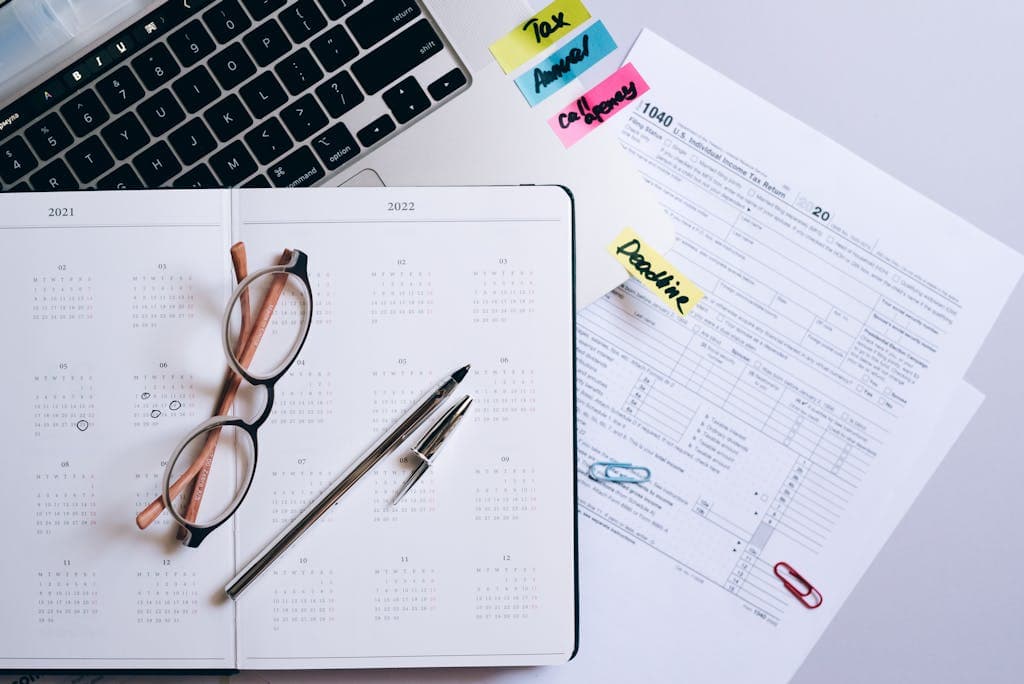
BY
|
How to Lodge a Tax Return in Australia
Tax time rolls around every year, and it can be a source of stress and confusion for many Australians. But it doesn’t have to be that way. With the right knowledge and preparation, lodging your tax return can be straightforward.
This guide will walk you through everything you need to know about lodging your tax return in Australia, from understanding the basics to submitting your return and claiming deductions.
Understanding Tax Returns in Australia
In Australia, the financial year spans from 1 July to 30 June. If you’ve earned income during this period, you’ll likely need to lodge a tax return to declare all your income. The Australian Taxation Office (ATO) uses the information in your tax return to calculate whether you’re entitled to a refund or need to pay additional tax.
Recent data from the ATO shows that as of 26 September 2024, over 8.2 million individual tax returns had been lodged for the 2024 tax year. This represents a 3% increase compared to the same time in the previous year, highlighting the importance of understanding and fulfilling your tax obligations.
Investment income, such as interest, dividends, and capital gains, is also crucial to report accurately to avoid any tax discrepancies.
Understanding Income Tax
Income tax is a big aspect of Australia’s financial system, levied by the government on an individual’s income or profits. This tax is a significant source of revenue, funding various public goods and services that benefit the community.
In Australia, the Australian Taxation Office (ATO) administers income tax. The ATO collects taxes, provides tax-related information, and enforces tax laws. Individuals and businesses must lodge a tax return with the ATO each year, reporting their income and claiming any eligible deductions and credits.
There are different types of income tax, including:
- Personal income tax: Levied on an individual’s income from employment, investments, and other sources.
- Business income tax: Levied on a business’s profits.
- Capital gains tax: Levied on the profit made from the sale of assets, such as property or shares.
Preparing to Lodge Your Tax Return
Before you start the lodgement process, gathering all necessary documents and information is essential. This includes:
- Payment summaries or income statements from your employers
- Bank statements showing interest earned
- Dividend statements from investments
- Records of any government payments received
- Receipts for work-related expenses or charitable donations
- Private health insurance details
Having all this information ready will ensure an accurate and complete tax return. It’s a good idea to keep these documents organised throughout the year to make the process smoother when tax time comes around.
Lodgement Options with a Registered Tax Agent
There are several ways to lodge your tax return in Australia, including the convenience and speed of completing a tax return online. The most common methods are:
1. Online using myTax: This is the ATO’s free online lodgement service.
2. Through a registered tax agent: A professional can prepare and lodge your return for a fee – like the Box Advisory Services team.
3. Paper tax return: While less common, you can still lodge a paper return by mail.
Each method has its pros and cons. MyTax is free and usually results in fast processing within two weeks. However, it requires a myGov account and some level of comfort with technology.
Using a registered tax agent can provide expert advice and potentially maximise your deductions, but it comes with a fee and may take longer. Paper tax returns are good for those without internet access but can take up to 10 weeks to process and have a higher risk of errors.
Keeping Records
Accurate and complete records are vital for complying with tax laws and regulations. Good record-keeping supports your tax returns, claims, and deductions and can be invaluable if you ever face a dispute or audit.
The ATO requires individuals and businesses to keep records for at least five years from the date of lodgment. Essential records include:
- Income statements and payment summaries
- Invoices and receipts
- Bank statements and transaction records
- Tax invoices and receipts
- Records of business expenses and income
There are various methods to keep these records organised:
- Manual records: Using paper-based systems, such as notebooks and files.
- Digital records: Using computer-based systems, such as spreadsheets and accounting software.
- Cloud-based records: Using online storage services, such as cloud accounting software.
Maintaining accurate and complete records helps ensure compliance with tax laws, supports your tax returns and claims, resolves disputes and audits, and aids in making informed business decisions.
Step-by-Step Guide to Lodging Online
Lodging online through myTax is the quickest and most popular method. Here’s a step-by-step guide to help you through the process:
1. Create a myGov account: If you don’t already have one, visit my.gov.au to set up an account.
2. Link your myGov account to the ATO: Follow the prompts to link the ATO to your myGov account.
3. Access myTax: Sign in to myGov and select ‘ATO’ from your linked services.
4. Start your tax return: Select ‘Lodgements’, then ‘Income Tax’.
5. Review pre-filled information: The ATO pre-fills much of your information. Review this carefully and add any missing details.
6. Enter your deductions: Add any work-related expenses or other deductions you’re claiming.
7. Review and submit: Double-check all information before submitting your return.
Submitting a Non-Lodgment Advice
A non-lodgment advice is a document that informs the ATO that you do not need to lodge a tax return for a particular financial year. This might be the case if you have no taxable income or if your income is below the threshold requiring a tax return.
To submit a non-lodgment advice, you can:
- Lodge online using the ATO’s online services.
- Lodge by post using a paper non-lodgment advice form.
- Use a registered tax agent to lodge on your behalf.
Ensure you meet the eligibility criteria for a non-lodgment advice and provide accurate and complete information. This step is crucial to avoid any misunderstandings or issues with the ATO.
Common Deductions and Claims
Understanding what you can claim as a deduction can help maximise your tax return. Some common deductions include:
- Work-related expenses: This category covers various items, such as uniforms, tools, and professional development costs. If you use something for work, there’s a chance you can claim it.
- Home office expenses: These deductions have become increasingly relevant with more people working from home. You can claim some of your electricity, internet, and rent or mortgage interest if you have a dedicated home office space.
- Vehicle and travel expenses related to work: If you use your vehicle for work purposes (excluding commuting to and from your regular workplace), you can claim these expenses.
- Charitable donations: Donations to registered charities are generally tax-deductible.
Working from Home Deductions
If you work from home, you may be eligible for various deductions on your tax return for work-related expenses. These deductions can help reduce your taxable income and lower your tax liability.
To claim working-from-home deductions, you must:
- Keep accurate records of your expenses.
- Ensure that the costs are work-related and not personal.
- Use a reasonable method to calculate the deduction.
Common working-from-home deductions include:
- Home office expenses: Such as rent, utilities, and internet costs.
- Equipment and furniture: Such as computers, printers, and desks.
- Travel expenses: Such as transportation costs to and from work-related appointments.
The ATO’s home office expenses calculator can help you accurately calculate your deduction, ensuring you claim the correct amount.
Important Dates and Deadlines
Keeping track of key dates can help you avoid penalties and ensure a smooth tax lodgement process. Here are the dates you need to know:
- 1 July: Start of the new financial year
- 31 October: Deadline for lodging your own tax return
- 21 November: Due date for paying any tax owed if you lodge your own return by 31 October
You can find a full list of key tax dates and deadlines here.
If you use a registered tax agent, you may have a later lodgement date, but you must engage them before 31 October. It’s always best to check with your tax agent about specific deadlines.
Due Dates and Penalties
Meeting tax deadlines is crucial to avoid penalties and interest. The due date for lodging tax returns is typically 31 October each year, although this can vary depending on your circumstances.
If you fail to lodge your tax return or pay your tax on time, you may face:
- Penalties: Such as fines and interest.
- Interest: On the amount of tax owed.
- Late lodgment fees: For failing to lodge your tax return on time.
To avoid these penalties, ensure you:
- Lodge your tax return and pay your tax on time.
- Use a registered tax agent to lodge your tax return if needed.
- Make payments promptly to avoid interest and penalties.
The ATO offers various options to help you manage your tax obligations, including online services, phone support, and face-to-face appointments. Staying on top of your tax responsibilities ensures a smoother tax time and helps you avoid unnecessary costs.
Tips for a Smooth Lodgement Process
- Lodge after late July: Most pre-fill information will be available by this time, making the process easier. This includes information from employers, banks, and government agencies.
- Double-check everything: Ensure all income is declared and deductions are legitimate. Small errors can lead to delays in processing your return.
- Keep good records: Maintain receipts and documentation for all claims. The ATO may ask for evidence of your deductions, so it’s best to be prepared.
- Consider professional help: If your tax affairs are complex, a registered tax agent can provide valuable assistance. They can help you navigate complicated tax laws and ensure you’re claiming all eligible deductions.
- Lodge on time: Meeting the lodgement deadline helps you avoid penalties and ensures you receive any refund promptly.
FAQs
Do I need to lodge a tax return?
You generally need to lodge a tax return if you earned income during the financial year. However, there are exceptions. You can use the ATO’s ‘Do I need to lodge?’ tool in your ATO online services account to check. Sign in to myGov, select ATO from your linked services, then navigate to ‘Manage tax returns’ and select the ‘Do I need to lodge?’ option under the ‘Not lodged’ tab.
What if I make a mistake on my tax return?
If you realise you’ve made a mistake after lodging your tax return, don’t worry. You can amend your return through myTax or by contacting the ATO. If the mistake results in you owing more tax, it’s best to amend your return as soon as possible to minimise any potential interest or penalties.
Can I lodge a tax return from outside Australia?
Yes, you can lodge a tax return from outside Australia. You can use myTax if you have a myGov account linked to the ATO. Alternatively, you can lodge a paper return. Before lodging, you’ll need to complete an Overseas Lodgment Declaration form. Remember, you must still be an Australian resident to lodge a return for tax purposes.
What if I can’t pay my tax bill by the due date?
If you’re having difficulty paying your tax bill, contact the ATO immediately. You may be eligible to set up a payment plan tailored to your circumstances. It’s best to act quickly, as interest can apply to any amount you owe after the due date.
How long does it take to receive my tax refund?
Most electronically lodged tax returns are processed within two weeks. If you lodged a paper return, it can take up to 10 weeks. Once your return is processed, it may take up to 5 business days for the refund to appear in your nominated bank account.
Lodging your tax return is essential, but it doesn’t have to be overwhelming. With proper preparation and understanding, you can navigate the process smoothly and ensure you’re meeting your tax responsibilities. Remember, if you’re ever unsure about your tax return, don’t hesitate to seek advice from the ATO or a registered tax agent. They’re there to help you get it right.



